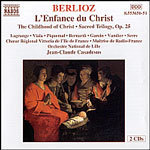
L'Enfance du Christ Op 25 (Complete oratorio)
 $28.00
Out of Stock
$28.00
Out of Stock6+ weeks add to cart
BERLIOZ
L'Enfance du Christ Op 25 (Complete oratorio)
Michele Lagrange ; Orchestre National de Lille-Region Nord ; Choeur Regional Vittoria de l'Ille de France ; Jean-Claude Casadesus, conductor
[ Naxos / 2 CD ]
Release Date: Tuesday 4 February 2003
This item is currently out of stock. It may take 6 or more weeks to obtain from when you place your order as this is a specialist product.
Hector Berlioz was born in 1803 at La Cote-St-Andre in the departement of Isere, the eldest son of a doctor of some local distinction.
Hector Berlioz was born in 1803 at La Cote-St-Andre in the departement of Isere, the eldest son of a doctor of some local distinction. After the closing of the nearby Imperial Seminary in 1811, he was educated by his father, who taught him Latin, giving him an early taste for Virgil, and passed on to him a love of literature. He also instructed him in the rudiments of music, through the flageolet and then the flute, the only instruments, along with the guitar that Berlioz was to play. His father, with his double passion for literature and for music, remained always a model for him; at his father's death in 1848, he wrote: It seems that my life no longer has an aim, instinctively there had always been, in my efforts, a tendency towards my father, a desire for his approval, a hope that he would be proud of them and now.
In 1821 Berlioz left his native region, the Dauphine, and went to Paris to embark on medical studies that he abandoned after 1824, entering the Conservatoire finally in 1826, where he became a pupil of Lesueur, Reich. and Cherubini. He won the Grand Prix de Rome on his filth attempt and spent several years in Italy. On his return to France his Symphonie fantastique and Retour a la vie (Return to Life) won enormous success after a concert at the Conservatoire. He then met the Irish actress Harriet Srnithson, with whom he had fallen in love some years before, when she was winning acclaim for her performances in Shakespeare. They married in 1833 and Louis, their only son, was born the following year. The marriage soon began to fail, Berlioz's idealised love giving way to Harriet's bitterness, as her career declined. After the failure of his fIrst opera, Benvenuto Cellini, Berlioz began to travel, in order to make his music known outside Paris, where he received little recognition. In fact he made his living principally from activities marginal to composition. A talented writer, he contributed to different publications from 1833 onwards. He also became librarian at the Conservatoire and, in 1856, a member of the Institut. Harriet, from whom he had long been separated, died in March 1854 and Berlioz took as his second wife his long-term companion Marie Recio. His life ended in sadness: apart from the success of L' Enfance du Christ in 1854 and the Te Deum in 1855, he met with incomprehension from Paris audiences. He wrote nothing after the failure of his opera Les Troyens (The Trojans) in 1863. The death of Marie in 1862, but above all that of his son in 1867 threw a shadow over his life that the triumph of his final journey to St Petersburg was unable to lighten. He died on his return, in 1869.
Berlioz dominates French musical romanticism, in perfect harmony with his period: 1830 was the year of the fIrst performance of the Symphony fantastique, but also that of Victor Hugo's Hernani and of the painting by Delacroix, Liberty Guiding the People. These have a number of things in common: exaltation of feelings, the desire to undertake work of vast dimensions, an acute sense of colour.
From his childhood Berlioz had preserved his taste for both music and literature: one never went without the other. His entire work has an underlying text, not only in opera, of course, but also his orchestral work, always tied to a programme, a literary sub-text. He was, nevertheless, a wonderful symphonist, constantly exploring the expressive possibilities of different instrumental timbres and writing the first treatise on orchestration.
Berlioz wrote little in the traditional forms in use in the nineteenth century - a literary argument every time determining the structure - something that makes it difficult to classify works such as the dramatic symphony Romeo et Juliette, with chorus, soloist and a prologue in choral recitative, or the dramatic legend La Damnation de Faust (The Damnation of Faust), something between symphony and cantata, an opera for an imaginary theatre.
If the work of Berlioz is divided according to the usual criteria, besides the four symphonies and seven overtures, there are principally vocal compositions: the three operas, Benvenuto Cellini, Beatrice et Benedict and Les Troyens; church music, the famous Requiem, the Te Deum and the recently rediscovered Mass, Passing over in silence the three cantatas written for the Prix de Rome, attention must be drawn to his virtual invention of French song, with the two cycles of Melodies irlandaises (Irish Songs) and Nuits d' ete (Summer Nights). Eerlioz also distinguished himself in the field of oratorio with L'Enfance du Christ.

